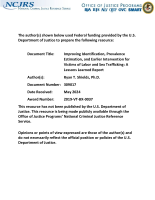Victims of crime
NIJ FY24 Invited to Apply - Byrne Discretionary Community Project Grants/Byrne Discretionary Grants Program
Understanding the Impact of COVID-19 on Victim Services
Understanding the Impact of COVID-19 on Victim Services
The COVID-19 pandemic had a detrimental impact on communities across the nation and significantly affected various aspects of individuals’ lives. One of the negative impacts was an increase in gender-based violence accompanied by shifting barriers to accessing services and support. Victims and victim service providers faced various challenges dealing with the increase in need for services, navigating barriers to help-seeking, and addressing logistical issues.
See the YouTube Terms of Service and Google Privacy Policy
Improving Sex Trafficking Victim Identification: Indicators of Trafficking in Online Escort Ads
Tools to Support Campus Sexual Assault Prevention and Response
Improving Identification, Prevalence Estimation, and Earlier Intervention for Victims of Labor and Sex Trafficking: A Lessons Learned Report
Unconventional Wisdom: Research Shakes Up Assumptions About Sex Trafficking Clues in Online Escort Ads
Understanding the Impact of COVID-19 on Victim Services



